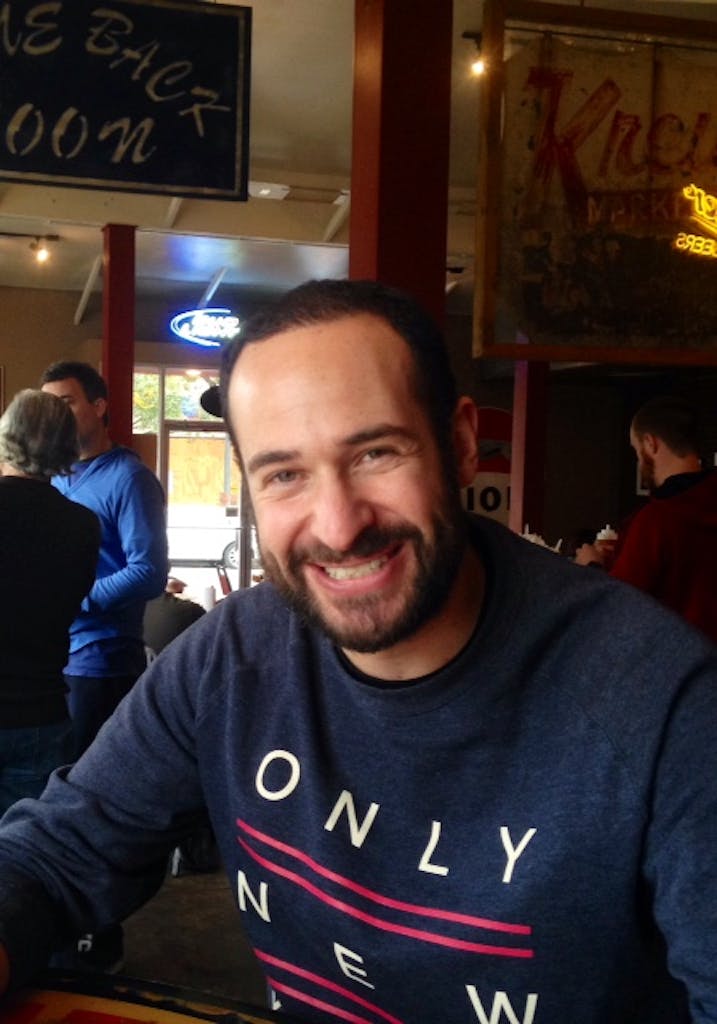 Owner: The Beast: Maison Deviandes Fumees, opened 2014
Owner: The Beast: Maison Deviandes Fumees, opened 2014
Age: 31
Smoker: Wood-fired rotisserie smoker (once it’s delivered)
Wood: Oak
I was in line for the bathroom at Hill Country BBQ Market in New York when a man who recognized me approached. He wanted to know if I could find a Texas pitmaster for him to apprentice with. This man wanted to open a Texas-style barbecue joint in Paris…France.
That was almost a year ago. Since then Thomas Abramowicz has traveled across Texas and back to France with some new cooking skills, and a new offset smoker. Last weekend he did his first pop-up barbecue event in Paris. “I sold out after less than three hours and served four hundred Black Angus beef rib sandwiches.” Calling his new venture The Beast: Maison Deviandes Fumees (Smoked Meat House), he plans for a permanent spot to open in July in the Marais area at 27 rue Meslay, 75003 Paris, in case you’d like to visit.
The menu will be simple to start. “We will be serving U.S. Black Angus brisket and beef ribs, as well as high quality French pork and poultry.” Expect pickles and onions for garnish, and sauce on the side.
This interview was done at Lockhart Smokehouse in December, but Thomas asked that I not release it until he secured his location. He wanted to be first, and the restaurant industry in Paris is especially competitive. When we spoke Thomas was unaware of another Texas BBQ joint already operating in Paris. Blues Bar-B-Q was opened by American expat Diana Darrah in 2010. Maybe Paris is ripe for its first barbecue rivalry.
Daniel Vaughn: I find it fascinating that Texas barbecue is so popular that people such as yourself have traveled this far to come learn the history and the techniques of our barbecue here in Texas. What has caused such popularity in Europe?
Thomas Abramowicz: There are several factors to that. First, Europe a few years ago wasn’t ready to try new things. It was closed-minded, especially in France. People just weren’t open to new cuisine, wine, beer…
DV: They were only open to traditional foods?
TA: Yes. Mainly French food. But, in the last few years people have realized that there is good stuff abroad. They realized that French people aren’t the only ones to do good food. Thank God we’ve finally come to that point. Now you see taco places opening in Paris, Eastern European spots opening, American spots booming.
DV: And what defines “American” food in France?
TA: Five years ago in Paris we didn’t have a good hamburger spot, food trucks, or hot dogs. Now we have something like fifty food trucks running around Paris.
DV: Are the food trucks serving foods that aren’t traditional?
TA: Yes. Most of them are serving non-French food. It started with burgers. There’s a lady from California who moved to Paris for culinary school. She opened the burger food trucks [Cantine California] and is a huge success.
DV: The U.S. has many barbecue traditions. What brought you here to this part of the country?
TA: Friends of mine live here, so I spent Thanksgiving in Fort Worth. Then I drove down to Austin. I spent two weeks driving around eating barbecue. The first big one I went to was Louie Mueller Barbecue in Taylor. It was awesome. I met Wayne [Mueller] in New York. We lost track of each other. I went to say hi, and he was so happy that I came to visit. He offered to train me if I came back the following day. I spent the day with him. It was awesome. You can feel the history there. It means something.
DV: That’ll be hard to replicate in Paris.
TA: It’ll take eighty years. I just don’t think I’ll still be there.
DV: Where else did you visit?
TA: I spent some time in Lockhart. I went to Black’s, Smitty’s, and Kreuz. All of them were some of the best barbecue I’ve had in my life. I also went to Franklin. I got in line at 8:00am. I couldn’t believe it that people would queue for barbecue that early. It’s insane. Benji was there and he took the time to show me around. It was really great.
DV: Then you came back to Dallas?
TA: I ended my trip at J&R Manufacturing for the training course. Here I ate at Slow Bone and now Lockhart Smokehouse.
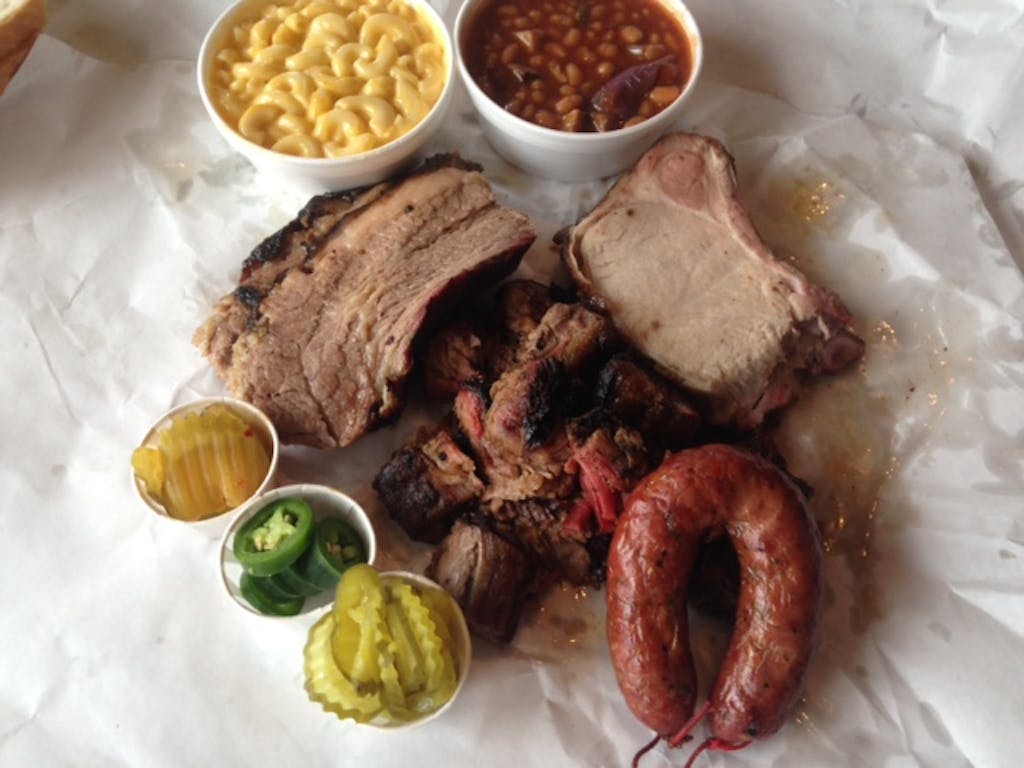
DV: Are you gonna ride back across the Atlantic on a ship with your new J&R smoker?
TA: I wish I could do that. They need to build it first.
DV: So, you are definitely going to purchase a J&R?
TA: I think so. When you smoke in a big city like Paris with the regulations…I won’t have a backyard or open space, so it’s the only possibility I have. Also, It’s very expensive to sign a lease in Paris. Just to have the right to sign the lease I have to pay around [Thomas asked that I not disclose the figure, but you could get a three bedroom house in Frisco for about the same].
DV: Wow. And that doesn’t cover your lease?
TA: No. That’s just for the right to lease it. Then you pay rent every month.
DV: That’s expensive, but I guess you knew that going into it. Are you originally from Paris?
TA: Yes. I also lived in New York for three years in my previous life.
DV: What was that previous life?
TA: Marketing. It’s hard for me to even say it now. I was working for the biggest French company – LVMH. Louis Vuitton, Hennessy…
DV: Is this new barbecue joint going to serve Hennessey?
TA: Dr Pepper? Yes. Hennessy? No. Before I flew to Texas I took a three day trip through Kentucky for a bourbon tour. I’ll have a big bourbon selection.
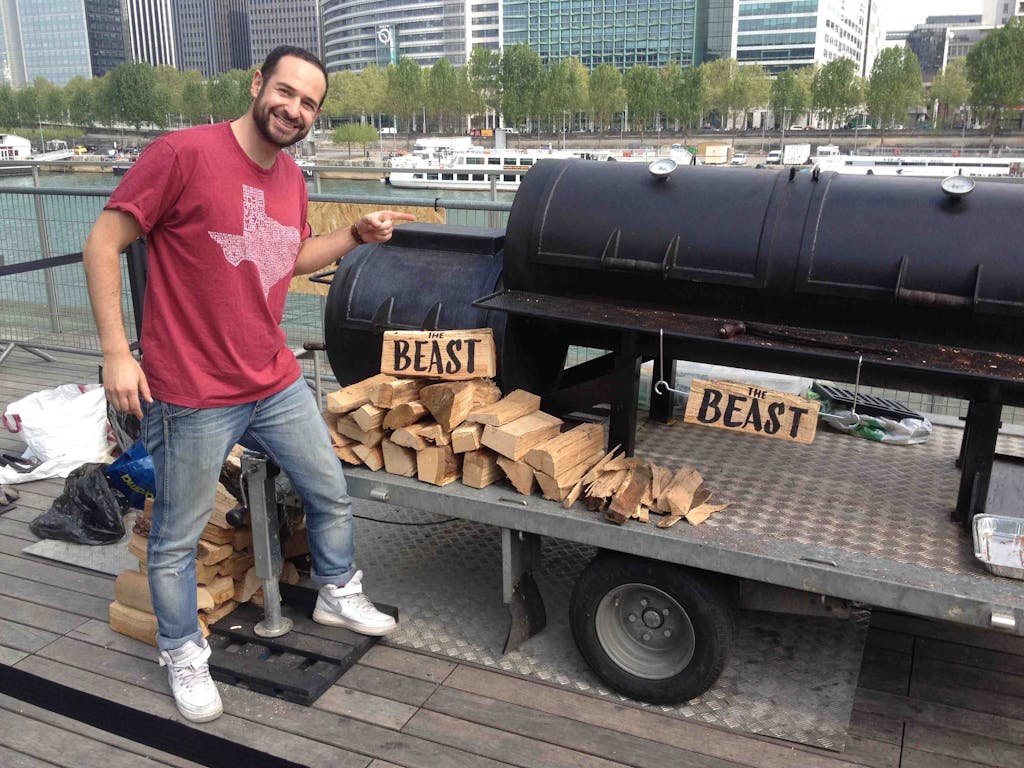
DV: Are there any other barbecue joints in Paris?
TA: No. None. People there don’t know barbecue. [There is actually one that I could find called Blues Bar-B-Q, open since 2010.]
DV: Have you done any research to see if there’s actually a demand for something like Texas barbecue?
TA: There are a few signals that are reassuring. Paris is ready. It wasn’t three years ago. We also eat a lot of meat. We eat meat in France every meal. We just cook them differently. Everything that is a growing trend in New York becomes a trend in Paris three years later. With the barbecue revolution going on in this country, I think it’s the right time to open in Paris.
DV: Is this purely a commercial opportunity?
TA: No. Otherwise I would just stay in France and buy a couple of books about barbecue. We already have smokers there that we use for salmon, hams, and sausage. My point is that I want to respect the Texas tradition and the heritage to do it right. I don’t want to mess around. That why I came here to learn.
DV: Have you ever been to Paris, Texas?
TA: No, I haven’t. I’ve seen the movie, though.
DV: Can you go to a meat market in Paris and buy a whole brisket?
TA: No. That’s another issue. The way you cut cows in France is different. A T-bone doesn’t exist in France. We use part of the brisket, but it’s not called brisket. I found a butcher who is probably one of the best in France. He only works with the best beef and pork you can find. He’s the sole importer of Wagyu and Kobe beef into France. He knows brisket, and he’s able to custom cut for me.
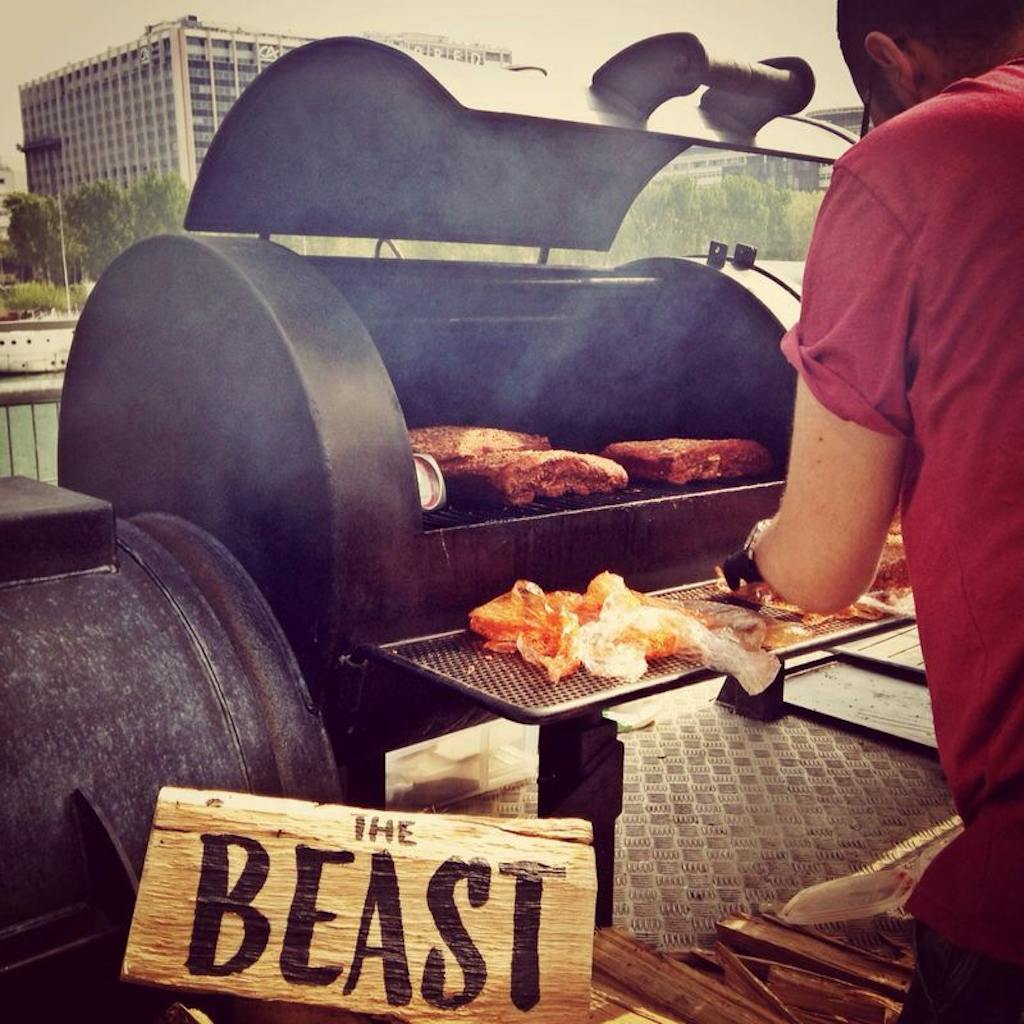
DV: I know France is known for agriculture, but how big a role does beef cattle take in that?
TA: Huge.
DV: And is that the most popular meat to eat in France?
TA: Beef is probably the most popular. Pork and chicken are huge. Sausage is big too. I tried to find a French cow that has the marbling to match Angus beef. The meat is leaner. They are grass-fed, so it’s hard to find a good amount of marbling in the beef. I think I’m going to have to import American Black Angus.
DV: What will be on the menu?
TA: Brisket, beef ribs, chicken, pork ribs, and pulled pork. I’m going to keep it simple. Five meats and five sides. I want to make it simple and perfectly cooked.
DV: What kind of wood do you plan to use?
TA: Oak. We have a lot of oak. We don’t have mesquite, but I don’t want to smoke with mesquite.
DV: What is the French word for this type of barbecue?
TA: Nothing. I’m going to use “Smokehouse.” The word barbecue means grilling on charcoal in France.
DV: Have you ever heard the theory that the word barbecue is of French origin?
TA: Really?
DV: Yes. From beard to tail. “Barbe á queue.“
TA: Well, “queue” means ass. [laughing] I’ve never heard that. Is that real?
DV: It’s just a theory. So, if the French do grilling which they call barbecue, are there restaurants that specialize in grilled meats that are called barbecue restaurants?
TA: I can’t think of any. There are some popular steakhouses now. The most American one is called The Beef Club. They serve huge steaks.
DV: Is it considered “American” because of the gluttonous portions?
TA: Sort of. We like to believe that Americans eat a lot.
DV: Have you gone to try any of your European barbecue competition in the UK?
TA: I checked a few places out three months ago. I did five spots. Pitt Cue, Barbecoa, and Bodean’s BBQ which is misleading. It’s like the McDonald’s of barbecue.
DV: Why did you choose to replicate the Texas style.
TA: This is the most meat-focused school of barbecue. The others are more about sauce, covering the meat or adding other flavors. I think when you start with a great raw material, adding more stuff is there to cover something that’s not perfect.
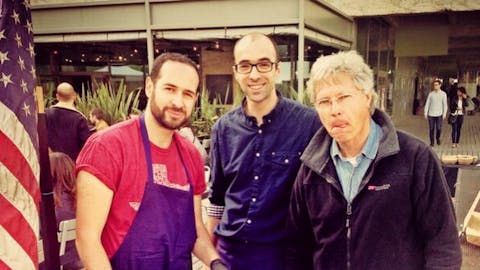
DV: Are there any negative attitudes in Paris about American style restaurants?
TA: I don’t think so. Everything that comes from the U.S. is a huge hit.
DV: Miley Cyrus?
TA: Maybe not everything. Anyways…think about hot dogs in Paris. It sounds insane, but it’s working. Steakhouses are all over. There is a positive connotation with tradition, and barbecue has that tradition. You have to find a story to tell.
DV: You’ll have Texas style barbecue and bourbon, but it cheap white bread going too far in Paris?
TA: Yes. That’s too far. We have that in the store, but it’s for breakfast with jam and butter. I met with a pastry chef in France who supplies a lot of restaurants including all the burger joints in Paris. I’ll use her buns for my sandwiches.
DV: What about the sides?
TA: The sides will be lighter. The French are ready to eat a lot of fat meat, but they like to think that if they eat some lighter veggies as sides, that it’s better for them. I’ll have cole slaw, steamed greens like kale, broccoli, and salads. There’ll be pickles. I’ll have to make fries too. Pecan pie and banana pudding are too rich, but I might have ice cream.
DV: And these pre-cut strips of orange longhorn cheese?
TA: No. I don’t think that would work.
DV: How much will you have to charge for brisket?
TA: It’s hard to determine. The raw meat will probably cost me around $7.00 per pound.
DV: What will you have to charge per pound?
TA: I’m not going to do it by the pound. I’ll do a small portion or a large portion.
DV: What did you really know about barbecue before you got into this endeavor?
TA: Not much, but I’m a good learner.
DV: Were you smoking meat in France as a barbecue hobbyist?
TA: Not really. I don’t have a smoker. My friends in France call me a grill master. We use charcoal and vine wood. I pimped my kettle grill and tried to make it work as a smoker, but it brought me only to a point. I wanted to do it for real instead of for fun.
DV: So, you’re going from a pimped kettle grill straight to a J&R smoker?
TA: It’s more than that. Instead of just doing it for fun and for my friends, I want to introduce Texas barbecue to Paris…
DV:…one of the most famous food cities in the world.
TA: It’s going to be a big challenge, and I’m ready for it. I can’t say that I will succeed. I hope so, but I don’t know.







